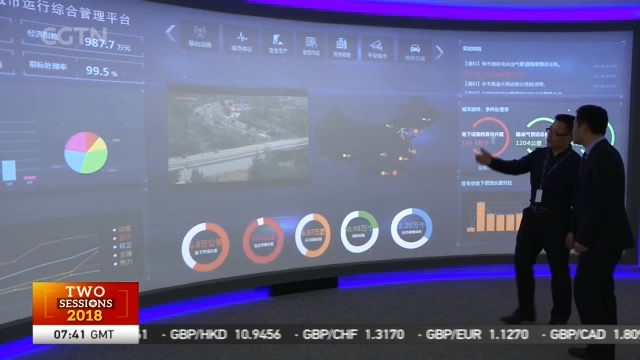
16:30, 14-Mar-2018
China Institutional Reform: Policies in place to stimulate vitality of market entities

China's reforms priorities this year include state-owned enterprises, finance and taxation. This is part of efforts to stimulate the vitality of market entities, including small and micro enterprises. Meng Qingsheng reports.
Finchain Technology is a startup company registered a year ago. It provides solutions for digital assets management, using blockchain technology. Its vice president says, as a small business, the company benefited from the changes brought about by institutional reform.
YAN YUANQUAN, VICE PRESIDENT BEIJING FINCHAIN TECHNOLOGY CO., LTD. "It's a time-consuming effort to apply for different licenses and documents at government departments. When my company got licenced at the end of 2016, things were much easier. I finished all the procedures online, and did not need to go there in person."
MENG QINGSHENG BEIJING "As of July, 2017, China had more than 70 million registered small and micro enterprises. As reform continues, the number is still picking up. Here in Beijing, a new enterprise is born every three minutes. The reform has made it easier and more efficient for companies to access markets."
Beijing started online registration service for new companies in 2016. It simplifies procedures to apply for licenses, and in a recent move, combines 15 different licenses into a single one. The reform is part of China's national efforts to invigorate market entities, in particular, a strategy to pursue innovation-driven development.
HE CHENG, CHIEF OF REGISTRATION DEPT. BEIJING ADMINISTRATION OF INDUSTRY & COMMERCE "Beijing has been pioneering online registration service across the country. We offer a whole range of documents in digital form, including business licenses, and archives. We also provide other online services to facilitate businesses. Here in Chaoyang District, applicants can get a digital business license within one day, if they go with the online method."
Timeloit started its business back in 2007. It provides smart city management solutions across China. While reform has brought more convenience to its daily business, the company still would like to see more effort from the government to expand the reform.
WANG GUOJIN, VICE PRESIDENT BEIJING TIMELOIT TECHNOLOGY CO., LTD. "It's convenient to get the business done in Beijing, but not for inter-province practices. I call for more reform measures to facilitate filing inquiries, and further shorten the working procedures in other areas, like terminating a company and the issuing of certain certificates."
China's central government has highlighted new efforts to break institutional barriers as part of its work in 2018. On top of the agenda are innovation at grassroots level and concrete measures against some formalities. They are expected to bring about more changes to public service, and facilitate the burgeoning of small and micro enterprises. Meng Qingsheng, CGTN, Beijing.

SITEMAP
Copyright © 2018 CGTN. Beijing ICP prepared NO.16065310-3
Copyright © 2018 CGTN. Beijing ICP prepared NO.16065310-3